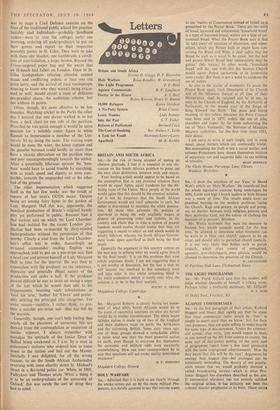HOLY WARFARE '
SIR,—Admitted that it is hard to see clearly through the smoke-screen put up by the more militant Pro- testants, it is hardly accurate to say that anyone wants to use 'wafers at Communion instead of bread, as is prescribed by the Prayer Book.' There are two sorts of bread, leavened and unleavened; 'household bread' is a type of leavened bread; wafers are a type of un- leavened bread. What the Prayer Book says is that 'to take away all occasion of dissension, and super- stition, which any Person bath or might have con- cerning the Bread and Wine, it shall suffice that the Bread be such as is usual to be eaten; but the best and purest Wheat Bread that conveniently may be gotten.' (My italics.) In other words, 'household bread' will do; and with this the Roman Church would agree—Potest eucharistia et in fermentato pane con lid. But there is not a word to condemn the use of wafers.
So also in the matter of vestments. To quote the Prayer Book again, 'such Ornaments of the Church and of the Ministers thereof at all time of their Ministration, shall be retained and be in use, as were in the Church of England, by the Authority of Parliament, in the second year of the Reign of King Edward the Sixth.' The plain and literal meaning of this rubric, whatever the Privy Council may have said in 1877, orders the use of albs, chasubles and copes. So far from authorisi.ng the use of 'Mass Vestments,' the Vestures of Ministers Measure authorises, for the first time since 1553, their disuse.
I am sorry to write at such length, and in some detail, about matters which are confessedly trivial. But maintaining the truth is not a trivial matter, and extreme Protestants have shown themselves masters of suppressio i.eri and suggestio falsi—to say nothing










































 Previous page
Previous page